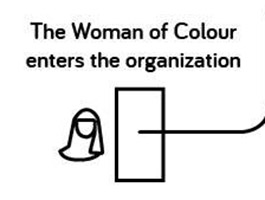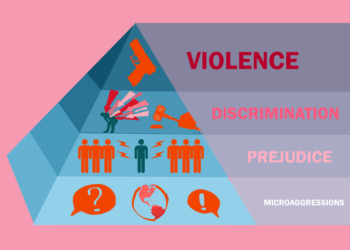Editor’s Note: This post was authored by Miranda Walker and Randy Townsend, in collaboration and with the full support of SSP President Lauren Kane. The SSP Statement that follows was authored and endorsed by the SSP Board of Directors and Co-Chairs of the Diversity, Equity, and Inclusion Committee.
On May 25, 2020, a 46-year-old Black man was held down by the knee of a Minneapolis police officer for 8 minutes and 46 seconds, while three other officers stood by. A teenager made the decision to capture the moment with her mobile phone. The man, George Floyd, died and the officers ended their shifts and went home.
The video, however, remained focused on the scene and has come to mean different things to different people. The lack of accountability of the officers’ actions was yet another painful reminder to Black Americans that “for young men of color, police use of force is among the leading causes of death.” For so many others, throughout the world, it was the horn that finally blew loud enough to get their attention that something in this country is systemically broken. As the world erupted in protest, universities, commercial companies, and societies have issued statements of support acknowledging that there is work to be done. While there is no way to predict that these unified voices will fix this entrenched historical flaw in the United States, they serve the purpose in letting those suppressed know that they do not stand alone, their cries of injustice and racism have been heard.
Statement from the Society for Scholarly Publishing Board of Directors and Co-Chairs of the Diversity, Equity & Inclusion Committee:
Reaffirming our Commitment to Diversity, Equity, and Inclusion
The recent murder of George Floyd has amplified issues of systemic racism and marginalization of black communities. The Society for Scholarly Publishing (SSP) denounces racism of any kind and reaffirms our commitment to diversity, equity, and inclusion. As we bear witness to the brutality unfolding in the United States and across the world, we are reminded that there is so much work to be done. We acknowledge that this does not happen automatically, and requires deliberate action.
SSP exists for its members. We represent a diverse and global community united by our involvement in scholarly publishing and communications. SSP leverages the collective expertise of both our member organizations and our individual members, which includes their contribution to open and inclusive discussions.
Collectively, we cannot stay silent and simply hope for a more equitable future. This is a moment in time where we, in a firm, loud, and unified voice, must be clear about our support for every member of our community — a community that is stronger and smarter and more well-positioned to face our future collective challenges — precisely because it is diverse.
A cornerstone of SSP’s strategic plan is to foster diversity, equity, and inclusion through demonstrated leadership in the effort to expand the diversity of professionals working in scholarly communications and fostering a culture of inclusion through awareness, outreach, and striving for diverse and balanced representation across all programs. Concrete steps we are taking to meet this goal include:
- Providing leadership for the Coalition for Diversity and Inclusion in Scholarly Publishing (C4DISC), an intraorganizational body of 10 trade and professional organizations formed to discuss and address issues of diversity and inclusion.
- Actively recruiting more diverse voices for The Scholarly Kitchen, webinars, and other SSP programming, including ensuring diversity among speakers and keynotes for the SSP Annual Meeting.
- Creating educational content focused on diversity, equity, and inclusion for The Scholarly Kitchen, webinars, and other SSP programming each year.
- Including Diversity, Equity and Inclusion (DE&I) Committee liaisons on all SSP committees to ensure prioritization of diversity, equity, and inclusion goals for all programs.
- Enforcing a code of conduct which underscores a zero-tolerance approach to racism and any other forms of discrimination or abuse.
We believe in a fundamental respect for the dignity of every human, regardless of their color, creed, or cause. The only path is forward; together we will work to continue building bridges of trust, respect, and understanding to ensure that SSP remains a safe and inclusive community that values the rights of all.
SSP invites the scholarly publishing community to share links to their organizations’ statements and efforts to increase diversity and inclusion in the comments below.
Discussion
13 Thoughts on "Collective Voices: The Society for Scholarly Publishing Joins in Making a Statement Against Racism"
I really appreciate how explicit and thorough this message is. A great model for organizational communication.
I do not in any way wish to downplay the outrageousness of what we saw happen in Minneapolis to George Floyd, but what direct evidence do you have that this terrible tragedy was the result of racism and not simply terrible policing other than the color of Mr. Floyd’s skin?
Because if it was not about race, which it should never be, why now? Why this man? Where was your outcry last year when Tony Timpa was similarly killed by being crushed, over a 13 minute period, while the officers stood by and had their laughter recorded on their body cams? Where was your statement of outrage when the charges were dropped against the officers even though Timpa was not an alleged criminal resisting arrest, but rather an ill man who called the police for help and who was already handcuffed when they arrived?
I’m guessing you’ve never heard of Tony Timpa. I’m guessing that this is just another example of selective outrage in the media and in our society, which only seems to care about police misconduct if the victim fits the established narrative of institutionalized racism, feeding you only the information they want you to have in support of that narrative.
We deserve better from the police, from our leaders, from our media, and yes, even from our professional associations. If you truly believe in diversity, please remember that the color of the victim’s skin is not the issue. It’s that they were a victim at all. And if you choose to continue down this road of politicizing scholarly publishing, please remember that diversity exists in points of view as well as socioeconomic status, skin color, and gender.
#JusticeForGeorgeFloyd. #JusticeForTonyTimpa. #JusticeForDavidDorn
Hi Paul, of course any form of police brutality should be condemned. However, given the wealth of research (much of it published by SSP members) on disproportionate police violence against people of color (in particular Black men), it is disingenuous at best and dishonest at worst to deny the existence and impact of systemic police racism. This 2019 paper, for example, reports research showing that “Black men are about 2.5 times more likely to be killed by police over the life course than are white men. Black women are about 1.4 times more likely to be killed by police than are white women.” (https://doi.org/10.1073/pnas.1821204116) And there are many, many more such studies. I am personally proud that SSP has taken a stand on this, as has my own organization (NISO) – see https://www.niso.org/niso-io/2020/06/niso-statement-protests-america-and-social-justice. Thanks, Alice
~Speaking for myself and not on behalf of PLOS~
While I appreciate SSP and the SK making this statement, the work around DEI is news to me. Perhaps I am insufficiently plugged into the “network.” Perhaps the network doesn’t speak to me.
The make-up of SK chefs is still predominantly male, white, and senior in the industry. The voices dominant in comments here and on lists-servs across the industry reflect the same — even in spaces with majority women engagers like librarian list-servs.
Many of the comments* to my post way back in 2017 — “When Politics and Metrics Collide” — reflected more of the same and how certain dominant voices and influencers were SO unwilling to engage with the fundamental argument.
Meanwhile, numerous organizations have reached out to me during this difficult time to help them craft statements of support to their employees and members. While BIPOCs like me appreciate the chance to weigh in, reaching out to POCs once in awhile during moments of upheaval is not good enough. Until DEI is built into the fabric of organizations and not merely “scooped out” into specific committees or programming, these exercises run the risk of “checking the box” without actually addressing the structural issues.
There is reason why our industry is dominated by the same voices. There are active steps we can take to change this. What are the DEI programming and committees recommending to their orgs and what are those orgs doing to enact those recommendations?
Until we see a concerted and consistent effort to grapple with these issues, these statements will continue to be…statements. #blacklivesmatter
*Big thanks to the Chefs who countered the misreadings of my argument.
Hi Sara, thanks for sharing your thoughts. Speaking on behalf of TSK, you’re right, increasing our diversity continues to be a struggle for us. I think we’ve done a good job on gender diversity, going from mostly male authors to a 50:50 male:female balance in our regular contributing Chefs, but given the makeup of our community, that was in many ways low-hanging fruit.
I’ve written in the past about why I think it’s been hard for us to do better — blogging as an activity only appeals to a small subsection of people to start with, and the fact that much of this blog deals with analysis and publicly stating opinions that may upset others means that we are often writing from a position of privilege — those most vulnerable in our community don’t have the security to act the same way. I think one area that’s been helpful has been driving our guest author efforts, where we’ve increased the diversity of viewpoints along with improving the geographical and racial diversity of our contributors (full list of guest authors here: https://scholarlykitchen.sspnet.org/chefs/guest-authors/).
Those are small steps though, and much work remains. We want TSK to represent the global and diverse community that makes up the SSP, and we promise to continue our efforts to improve things.
Sara, SSP elevated the Task Force on Diversity and Inclusion to the Committee on Diversity, Equity, and Inclusion a little over a year ago. I am sorry that you haven’t seen the fruits of their labor. The committee has organized sessions at the Annual Meeting, webinars on DEI issues, and posts in TSK.
SSP has also held a leadership role in the creation of C4DISC, with the SSP Executive Director being a chair of that group and support for funding. Further, we are in the process of launching a philanthropic fund, which will, in part, providing for lasting funding of DEI initiatives. The committee itself is a brain trust of individuals from our community that are sharing what their organizations are implementing by means of learning from each other and bringing new ideas back home. The programming they are creating is sharing these practices with the rest of us.
Lastly, advancing DEI initiatives is one of the organizational goals in the strategic plan. SSP has made a commitment to DEI and this statement made today, under these tragic circumstances, is an opportunity to further a commitment to DEI. Please feel free to reach out if you have any other questions.
Thanks for this overview, Angela. It’s a good start. I will be eager to hear what actionable outcomes SSP and TSK take in light of these efforts. Will they include efforts to recruit more black and brown folks into the industry. Mentorship for emerging leaders of color? Outreach to PhDs/postdocs? Initiatives to support entrepreneurs? Scholarships to support undergrads in fields relevant to our publishing houses? Succession planning within organizations to groom the next gen of POC executives? Webinars and conference sessions are great, but I’d like to see metrics that show initiatives have moved the needle.
(Last UKSG, the opening panel was on women thriving in STEM — not a single woman of color in the group. When asked why the answer was: We’re focusing on “women’s issues” first. As if these things can be separated. That’s how far we have to go in educating ourselves. It will take uncomfortable discussions and initiatives. Who’s willing to be uncomfortable?)
Sara, I really appreciate the questions you ask here. There is so much more we must do. I have been involved in efforts that affirmatively answer some of them and know of planning/development for some. Others are not yet underway or I am not aware they are underway … but having heard your questions I’ll be looking for ways to move “not yet” into “now” however I am able to and especially as an SSP Board member.
I recall that response to the question about that panel. What a vivid example of centering of whiteness – that white women’s issues are women’s issues/women’s issues are white women’s issues. The perspective that women of color’s issues need to wait until white women’s issues area addressed is something we need to reject definitely and forcefully.
(sorry to be late the the party here). The conversaitons I’ve seen within the publishing community have focused far too much on the ‘why’ and not enough on the ‘what’, in my view. The most common question I get when I’m presenting on inclusion (in my case, it’s disability inclusion, but the principles are the same, I think) is ‘That’s great, I get it, but what can I actually *do* in my company? What are the steps I can take that are achievable and affordable?’. I think we need to move the conversation on to practicalities – takeaways – things that people can actually action, that go beyond collecting hand-wringing. Perhaps these pages could be a forum for that? (and, needless to say, I’d be glad to contribute)
This week, we are seeing a flurry of statements like this one, all of them surely well-intentioned. I would like to call readers’ attention to another post today, that of my friend Trevor Dawes, the vice provost and university librarian at the University of Delaware. Trevor writes:
“I believe in the (what I hope are good) intentions of these statements and the often heartfelt sentiments behind them. I do find myself asking, though, when will we move beyond the statements? What ACTIONS will we take to move towards this just society to which so many of us make reference?”
https://trevordawes.wordpress.com/2020/06/04/statements/
As a member, it is my view that an organization like SSP should take responsibility for driving positive change not only in the organization itself but also in the community that it represents and services.
To that end, I am reminded of the appalling stories that were shared in two compelling posts in the Kitchen several years ago:
https://scholarlykitchen.sspnet.org/2018/04/04/excluded-testimonies-people-color-scholarly-publishing/
https://scholarlykitchen.sspnet.org/2018/05/10/excluded-testimonies-people-color-scholarly-publishing-part-ii/
There is far more that we as a community need to do in the service of equity and justice.
Thanks for trying, it certainly is appreciated. There is diversity and then there is the world’s black skin problem. The issue this world, the US in particular and scholarly publishing has is not a diversity issue, it’s a black skin issue and specifically a black male issue. You cannot change what’s in the heart with task forces, committees and endless panels. This is a spiritual issue and why it doesn’t go away. Last year’s SSP Annual Meeting ended with the all white panel of chefs discussing among other topics, DEI. Yet the one black Chef who was in attendance was not on the stage.This post is authored by two black members of the Society. Was no one else interested in addressing the issue? Get uncomfortable. Get in front of black/brown people(physically and virtually). Get into the middle and high schools, HBCU’s and talk about scholarly publishing and it’s relation to the “real world”. Now is the perfect time. Coronavirus/Covid-19 is a good jumping off point for starting a conversation about the scholarly publishing world.
Thanks Miranda, Randy, Lauren, Sara, Roger, and David, I think SSP has made a lot of progress from where it was a 4-5 years ago, the Fellowship Program is a great example, two of the Fellows, Sai Konda and Isabel Thompson are on, or have been on the SSP Board, all the 12 Fellows we select each year are mentored by past Board members, and there have been really excellent candidates from all background and demographics … but still, it does feel like there is so much more that can and should be done, and now is a time to rethink this, what is the vehicle for this rethinking to me is the key question ?
IMHO actions and support have to start earlier in the career development process, and we need to talk about this more deeply.
SSP’s goal is that there is a member from the DEI Committee also liaising as a member on all other committees. I was painfully reminded and had also challenged the situation, that the SSP Awards/Emerging Leader was very heavily white male-biased, but we do rely on applications being submitted to review, could we have done more to have facilitate more entries from POC, yes, will we do more next year, yes, the works starts now for this. Equally though Simon Holt (Emerging Leader) has done so much excellent work to shine a light on the challenges and benefits of people with disabilities over the last few years, this a voice and segment that has been very very quiet in publishing and SSP for far too long also. It’s not fair to play off one demographic with another, SSP does feel to be a very inclusive and supportive organization, that continues to make progress, but we need to hear the voices of all … please do sign up on a committee, come to the “Get Involved Event’ or reach out to a Board member, we do want to hear you, and us make a difference together.
No person of conscience could defend police brutality, dismiss good faith efforts to improve police training and methods, or deny that racism exists. No person of reason should be comfortable with the abandonment of skepticism, omission of important context, and so few dissenting voices to accepted narrative. As the anger and official statements from well-meaning organizations increase, reasonable people are excusing examples of all of the above as they consider characterizations of the police and the magnitude of the threat that police represent to the lives of citizens, and African American males in particular.
SSP’s efforts to promote a more diverse and inclusive organization are laudable, and its statements are not overtly anti-police, by any means. Also, to be fair, nothing in the article and comment thread above is unreasonable or intended to mislead. However, there are a few items that should give pause to SSP members who are interested in a fair consideration of the problem of police violence, and the degree to which this is responsible for the deaths of citizens.
Has justifiable anger over the indefensible murder of George Floyd caused even those in scholarly publishing to become uncurious about contextual information necessary to consider police violence?
Early in the article above, the article link contains the descriptor “police use of force is among the leading causes of death,” per the language within the article. (Many publications picked up on this article, including some that misrepresented the data right in the headline http://www.louisianaweekly.com/report-police-killings-are-the-leading-cause-of-death-among-black-men/) Wouldn’t the leading causes of death and where police use of force ranks among those causes be helpful context to understand here? I don’t know why this corresponding information isn’t included in the article or reference to the article, but it’s not hard to find:
According to the most recent CDC data on mortality, legal intervention is the 10th leading cause of death among non-Hispanic black males, ages 20-24. This represents 0.6% of total deaths for this age group. The leading cause of death for the same group is homicide, accounting for 47% of total deaths. (Legal intervention is not among the 10 leading causes of death among non-Hispanic black males ages 25-34.) https://www.cdc.gov/nchs/data/nvsr/nvsr68/nvsr68_06-508.pdf
This doesn’t invalidate the article, and we can’t dismiss deaths from law enforcement on the basis of how many there are, but wouldn’t this context help inform a rational assessment of the comparative threats to the lives of young African-American males?
The recent SSP reaffirmation of its commitment to diversity, equity, and inclusion includes this phrase: “As we bear witness to the brutality unfolding in the United States…” Is the SSP referring to the homicidal brutality to which we bear witness every year or only the portion that relates to police brutality?
Similarly, within the thread of comments, there is a reference to “disproportionate police violence against people of color (in particular Black men).” Many organizational statements have referenced this disproportionality in recent days. Can this be fairly assessed without considering the disproportionate reality of violent crime? According to the latest data, African-Americans represent 13% of the population and 43% of violent crime https://crime-data-explorer.fr.cloud.gov/explorer/national/united-states/crime. If disproportion is, in itself, concerning, then both disproportions must be relevant to any fair consideration related to policing. Can reasonable people agree that the disproportionate nature of police violence is more fairly understood and debated with at least the recognition of the disproportionate crime rates– and associated disproportionate police encounters?
It is now noncontroversial to characterize police violence and targeting of civilians in police shootings as a widespread problem. How often are statements accompanied with data, or the acknowledgment that these are, by any measurement, extremely rare occurrences? The Washington Post shows 1,003 total police shootings in 2019 nationwide. We can’t dismiss any unjustified shootings, but we also need to acknowledge the proportion of the 800,000 police officers in the United States that are responsible for them.
Outrage over the indefensible murder of George Floyd and a posture of skepticism towards the policing observations are not incompatible. The outrage is drowning out any semblance of skepticism that organizations committed to data driven conclusions should maintain. Reasonable people, who would otherwise avoid inveighing against entire groups, appear to be ready to accept and endorse broad, often misleading organizational statements reinforcing the narrative that the police, and not violent crime, represent the overriding problem that must be solved to protect lives.



